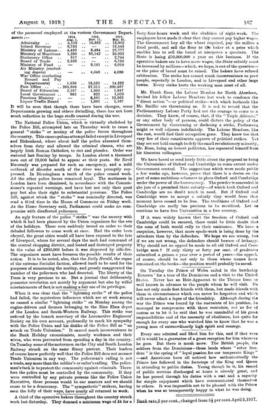The National Police Union, which is virtually abolished by the
Police Bill, attempted late on Thursday week to cause a general " strike " or mutiny of the police forces throughout the country. This unscrupulous attempt failed except in Liverpool and Birkenhead, where about half the police absented themselves from duty and allowed the criminal classes, who are largely Irish Roman Catholics, to riot and plunder. Order was restored last Sunday by troops. In London about a thousand men out of 19,000 failed to appear at their posts. Sir Nevil Macready was prepared for such an emergency, and a mild outbreak of disorder south of the river was promptly suppressed. In Birmingham a tenth of the police ceased work. All the other police forces remained loyal. The mutineers in London have been dismissed, in accordance with the Commissioner's repeated warnings, and have lost not only their good pay but also their right to substantial pensions. The Police Bill, against which the " strike " was nominally directed, was read a third time in the House of Commons on Friday week. As the Home Secretary said, Parliament could make no compromise with disaffected policemen.
An ugly feature of the police " strike " was the secrecy with which it had been planned by the Union organizers for the eve of the holidays. These men suddenly issued an order to their deluded followers to cease work at once. Had the order been obeyed, the great cities would all have been exposed to the fate of Liverpool, where for several days the mob had command of the central shopping district, and looted and destroyed property to the value of £200,000 before it was dispersed by rifle-fire. The organizers must have foreseen the possible results of their action. It is to be noted, also, that the Daily Herald, the organ of the extreme Socialist faction, allowed itself to be used for the purposes of announcing the mutiny, and grossly exaggerated the number of the policemen who had deserted. The liberty of the Press is very precious to us. But a journal that deliberately promotes revolution not merely by argument but also by wilful misstatements of fact is not making a fair use of its privileges.
When it was clear that the "lightning strike" of the police had failed, the mysterious influences which are at work among us caused a similar "lightning strike" on Monday among the engine-drivers and firemen belonging to the Nine Elms depot of the London and South-Western Railway. This strike was ordered by the branch secretary of the Locomotive Engineers' Society on his own account, professedly to mark his sympathy with the Police Union and his dislike of the Police Bill as "an attack on Trade Unionism." It caused much inconvenience to the Bank Holiday excursionists, mostly workmen and their wives, who were prevented from spending a day in the country. On Tuesday some of themotormen on the City and South London Railway struck on the same flimsy pretext. Their leaders of course know perfectly well that the Police Bill does not menace Trade Unionism in any way. The policeman's calling is not a trade, any more than the soldier's or sailor's calling. The policeman's task is to protect the community against criminals. Therefore the police must be controlled by the community. If they were controlled by any private persons like the Police Union Executive, those persons would be our masters and we should cease to be a democracy. The " sympathetic " strikers, having seen the folly of their ways, have nearly all returned to work.
A third of the operative bakers throughout the country struck work last Saturday. They demand a minimum wage of £4 for a
forty-four-hours week and the abolition of night-work. The employers have made it clear that they cannot pay higher wages. The Government buy all the wheat required, pay the millers a fixed profit, and sell the flour to tliti baker at a price which enables him to sell the bread at ninepence a quartern. The State is losing £50,000,000 a year on this business. If the operative bakers are to have more wages, the State subsidy must be increased by millions-which, we hope, is out of the questionor• the price of bread must be raised. The bakers have refused arbitration. The strike has caused much inconvenience to poor people, especially in London, and in Liverpool and other large towns. Every strike hurts the working man most of all.


































 Previous page
Previous page